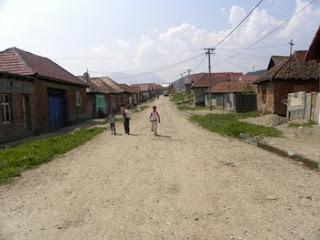
After our tour of the Shepherd's Village, Dan Marin of Transylvanian Wolf drives me to a village that begins on the other side of a bridge. Here, the road turns to gravel and married Roma women wear colorful headscarves while unmarried girls wear their hair in braids. The Roma, Dan says, tend to live outside Romanian towns and inside their own villages. They often remain tight-knit because the Roma have a strong sense of the gadge or foreigner, that is, anyone who isn’t Roma. This concept allows communities to retain their unique traditions and identity.
In Saticel, a village of one-thousand, the Roma still make cauldrons out of copper to sell at the markets. Hence, they are known as the Caldari or cauldron makers. Dan explains that the Roma divide themselves into eighteen diverse groups, named after their professions, such as the jewelry makers and the woodworkers. The musicians (called lautari) are famous for having inspired classical composers such as Franz Liszt and Johannes Brahms.
I ask if discrimination against the Roma in this region is widespread. Dan says that it depends. Many Romanians, like Europeans in general, blame all the social ills of society on the Roma. Others idealize the gypsy life. For example, the British writer, William Blacker, lived in Romania from 1996–2004 and wrote Along The Enchanted Way that chronicled his life with a Roma girlfriend and her community. Lately in Zarnesti, however, there have been discussions about how the Roma in Saticel obtain the copper to make their cauldrons. Some claim they pilfer the necessary materials from the railway lines.

Up a slope from the bridge, we come to a fork in the road where a boy races his motorbike. Dan tells me that the Roma tend to adopt the language of the country in which they live, often never learning Romani. They also convert to the religion of that country. But the locals in Saticel say that their community is divided by the fork in the road. On the left side of the road, the Roma have converted to sectarian religions (mainly Pentecostal). On the right side, they have adopted Eastern Orthodoxy, the religion adhered to by eighty-five percent of Romanians.

Dan turns right and we drive down a row of two-story homes. Petre Gabor, the Bulibasa (leader) of Saticel, lives somewhere in the middle. Like Dan, he is Eastern Orthodox. He is also fluent in Romani. His wife, Argentina, welcomes us inside and the rooms look impeccable with colorful carpets and artwork on the walls. But a hallway on the second floor has only wooden planks and dry wall. Petre explains that he is remodeling the upper floor in hopes of eventually using their home as a bed and breakfast for those interested in learning more about Roma culture.

After Dan and Petre spend some time talking about their upcoming projects, we drive back through Transylvanian towns. Today, the jobless rate among Romanians in Zarnesti is high, but the unemployment rate among the Roma reaches 96%. Dan and Petre together work hard to reverse this situation. Dan created the ‘Fundatia Rowan Romania’ charity program, which among other things, helped find employment for a Roma woman and gives guided tours of the Roma village as well as tourist presentations of traditional Roma dance and music. Dan is proud to tell me that his work has become so well respected that last year, for the first time ever, the Zarnesti town hall invited the Roma dance group to perform at their annual Romanian Festival.
While in recent months the French Prime Minister Nicolas Sarkozy began deporting the Roma population from his country, Dan’s approach to his Roma neighbors is different. He has reached out on the local level and continues to work for mutual cooperation and understanding.
Thank you, Dan Marin!

No comments:
Post a Comment